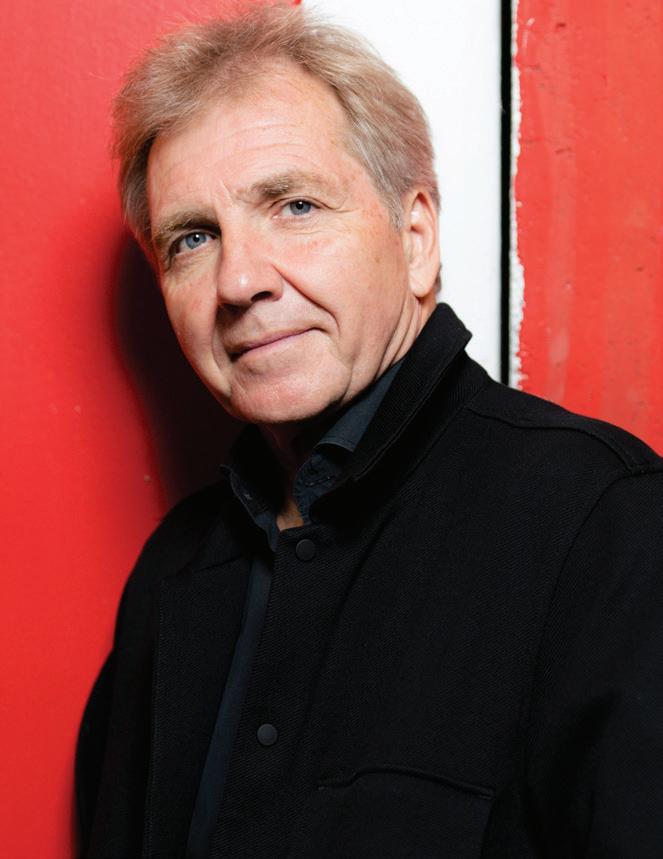“TRAGIC” SYMPHONY
FEBRUARY 28, 2025 / 7:30 PM / MAURICE ABRAVANEL HALL
MARCH 1, 2025 / 5:30 PM / MAURICE ABRAVANEL HALL
THIERRY FISCHER , conductor (Utah Symphony’s Music Director Emeritus)
MAHLER Symphony No. 6
I. Allegro energico, ma non troppo. Heftig, aber markig.
II. Andante moderato
III. Scherzo: Wuchtig
IV. Finale: Sostenuto – Allegro moderato
CONCERT SPONSOR

Thierry Fischer Conductor
Thierry Fischer has been Music Director of the São Paulo Symphony since January 2020 and of the Orquesta Sinfónica de Castilla y León since September 2022. He is also Music Director Emeritus of the Utah Symphony (where he was Music Director 2009–2023).
Fischer has conducted orchestras across the globe, notably the Cleveland Orchestra, the Boston, Atlanta and Cincinnati Symphonies, London Philharmonic, Royal Philharmonic, Oslo Philharmonic, Rotterdam Philharmonic, Maggio Musicale Firenze among others. He has performed and commissioned many world premieres, and works with the London Sinfonietta, Ensemble Intercontemporain but also other leading chamber orchestras such as the Chamber Orchestra of Europe, Orchestra of the Age of Enlightenment and Swedish Chamber.
April 2024 saw the launch of Frank Martin: Odyssey, of which Fischer is Artistic Director. To celebrate the 50th anniversary of his compatriot’s death Fischer has curated a series of concerts running through to the end of 2026 in which every note of Martin’s oeuvre will be performed in Geneva. As part of the festival he conducts the world premiere of a newly commissioned orchestration of the ballet Die Blaue Blume with the Orchestre de Chambre de Lausanne in their main season and at the Amsterdam Concertgebouw.
In 2024–25 he opens the Berlin Festwochen with the Sao Paulo Symphony in their 70th anniversary year, also taking the orchestra to the Edinburgh and Rheingau festivals and to the Concertgebouw. He continues his Mahler symphony cycle for the orchestra’s own label, recorded in the studio with the latest audio technology. Together with the Orquesta Sinfónica de Castilla y León he tours this season to the Hamburg Elbphilharmonie, Madrid Teatro Monumental, and to the Cartagena Festival (Colombia) for 6 concerts featuring Spanish music, continues his Beethoven cycle, and gives the European premiere of Gabriela Ortiz’ cello concerto – co-commissioned by OSESP (and also by the LA Philharmonic, Carnegie Hall, and Philharmonia).
Concluding a transformative 14 years in Utah - including the orchestra’s first visit to Carnegie Hall for the first time in 40 years, a Saint-Saëns cycle on Hyperion and many other highlights – in 2023 Fischer released on Hyperion Messiaen’s Des Canyons aux Étoiles (directly inspired by the awe-inspiring landscape of Utah State). The disc was shortlisted for the 2023 Gramophone Awards (orchestral category). In 2025 he returns to conduct the orchestra in a two-week Mahler festival, and at the League of American Orchestra conference, hosted this year in Salt Lake City.
Whilst Principal Conductor of the BBC National Orchestra of Wales 2006-2012, Fischer appeared every year at the BBC Proms, toured internationally, and recorded for Hyperion, Signum and Orfeo. In 2012 he won the ICMA Award for his Hyperion recording of Frank Martin’s Der Sturm with the Netherlands Radio Philharmonic Orchestra and Chorus. His discography also includes a Beethoven disc with the London Philharmonic on the Aparté label.
Fischer started out as Principal Flute in Hamburg and at the Zurich Opera. His conducting career began in his 30s when he replaced an ailing colleague, subsequently directing his first few concerts with the Chamber Orchestra of Europe where he was Principal Flute under Claudio Abbado. He spent his apprentice years in Holland and became Principal Conductor and Artistic Advisor of the Ulster Orchestra 2001-2006. He was Principal Guest of the Seoul Philharmonic 2017–2020 and Chief Conductor (now Honorary Guest) of the Nagoya Philharmonic 2008–2011.
By Jeff Counts
Symphony No. 6 in A Minor
Duration: 79 minutes in four movements.
THE COMPOSER – GUSTAV MAHLER (1860-1911) –Mahler was never just a composer. His conducting duties in Vienna during the first years of the 20th Century kept him very busy indeed, which makes the inhuman scale of his symphonies even more astounding to consider in retrospect. How did he do it, with his time and concentration so divided? As Director of the Hofoper, he maintained all the usual artistic responsibilities but also met and cultivated a vibrant professional association with the Viennese Secessionist designer Alfred Roller. The two collaborated on over 20 critically acclaimed opera productions and, through their intensive interrogation of theatrical tradition and expectation, changed the art form forever.
THE HISTORY – To call a piece “Tragic” is to invite inquiry into the life of its maker. Certainly, the scholarship around Schubert’s Symphony No. 4, Brahms’ Overture and Chopin’s Polonaise can be obsessive about understanding that nickname. The same can be said for Mahler, who according to Bruno Walter, did in fact refer to his Symphony No. 6 with that intense sobriquet. There has always been some doubt, as there often is with title aliases in music, about Mahler’s usage of the term “Tragic”. But Maestro Walter should be trusted on the matter, since Mahler’s Symphony No. 6 contains far too much tragedy and darkness to refuse him validation. Mahler was, by nearly every measure, living the
life of his dreams in 1903 and 1904 when he composed the piece, so its grim character stood in contrast to his personal reality. For a little while anyhow. The year of the Symphony’s first performance in Vienna, 1907, would contain plenty of strife for Mahler and make his music seem quite prophetic. The finale, for instance, included what the composer conceived of as a “hero” brought low by “three hammerblows of fate” (a staggering visual and sonic effect when done well in concert). He could not have known so in 1904, but that hammer would fall on him no less than four times later in the decade, with the death of his daughter Maria, the diagnosis of his heart disease, his break from the Vienna Hofoper and the discovery of Alma’s affair with Walter Gropius. Aside from all that grief, Mahler must have also been frustrated by the cool critical reception to Symphony No. 6. That, at least, he saw coming. “My Sixth,” he wrote in a 1904 letter with the score mostly complete, “will pose riddles that only a generation who has absorbed and truly understood my first five symphonies may attempt to solve.” We, today, are part of that generation and this mighty, deeply emotional music rewards our efforts richly.
THE WORLD – Elsewhere in 1904, the Russo-Japanese War began, Britain and France signed the Entente Cordiale, Charles Dillon Perrine discovered Jupiter’s largest irregular moon Himalia and Jack London published The Sea-Wolf
THE CONNECTION – Mahler 6 was most recently performed by the Utah Symphony in 2015. Thierry Fischer was on the podium.
CAST PARTY SPONSOR
PRODUCTION SPONSOR
ELIZABETH SOLOMON
LEADING LADY SPONSOR
JOANNE SHIEBLER GUEST ARTIST FUND
OPERA ARTISTIC DIRECTOR SPONSOR

FLORAL SEASON SPONSOR
VIP INTERMISSION RECEPTION SPONSOR VIP INTERMISSION BEVERAGE SPONSOR


